Wisdom Tooth Extractions – Richardson, TX
Wisdom Tooth Extractions – Richardson, TX
A wisdom tooth extraction is a rite of passage for patients, something that most people will have to deal with at some point in their life. However, it’s also a procedure that people tend to be a little bit nervous about. People tend to worry about what the surgery will entail, or how they’ll handle aftercare.
Thankfully, at Canyon Creek Family Dentistry of Richardson, we offer gentle wisdom tooth extractions for a pain-free tomorrow. If you happen to be near Richarson, make an appointment with us today and we’ll be happy to talk to you about what the procedure will entail.
Why Choose Canyon Creek Family Dentistry of Richardson for Wisdom Tooth Extractions?
- Team of Three Dedicated Dentists Who Will Attend to Your Needs
- Dental Office Designed with Patient Comfort in Mind
- In-Network With a Majority of Dental Plans
What Are Wisdom Teeth?
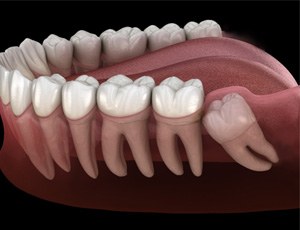
Most teeth grow in sometime in childhood. However, the last set of molars people get don’t emerge until sometime around early adulthood. These are the wisdom teeth.
It’s believed that these teeth are relics of an era of human history where people lost more of their teeth as they aged. However, this isn’t really the case nowadays, which makes wisdom teeth unnecessary. It’s also the case that not everyone will develop all four of their wisdom teeth; some people are naturally missing a few, while others are born without any at all.
Why Do Wisdom Teeth Need to Be Removed?
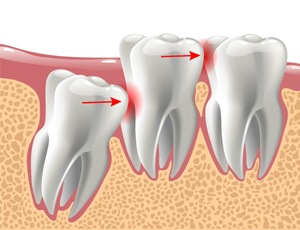
Typically, these teeth are unnecessary and may cause problems due to their late development. They’re unusually likely to be impacted, are susceptible to infection, and don’t do much to increase people’s overall bite strength. They might also affect the alignment of the surrounding teeth, pushing them out of place. That being the case, they’re usually removed as they begin to emerge.
If you notice that you’re experiencing pain or swelling associated with the emergence of your wisdom teeth, it might be a good idea to talk to us about taking them out.
What to Expect from the Wisdom Teeth Procedure
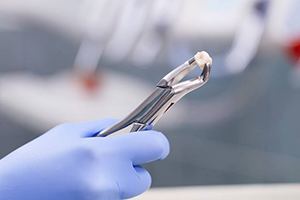
As with any procedure, we will numb your mouth completely in order to ensure that you’re completely comfortable for the duration of your treatment. We’ll also provide you with sedatives if you’re anxious about your procedure.
If a wisdom tooth has managed to emerge, this usually makes removing them simple. We will use a tool called an elevator to gently lift the tooth from its socket, and then a pair of forceps to take them out of place. If the wisdom tooth is impacted, surgery may be necessary to fully remove the tooth from beneath the gum’s surface.
Recovering From Wisdom Teeth Extraction

In the days after a wisdom tooth extraction, it’s common for people to be a little bit sore. This could be accompanied by some bleeding and facial swelling. We will give you detailed instructions for aftercare when we meet you for your consultation, but for posterity here are a few things that you should keep in mind:
- Stick to your dental hygiene routine, including gently rinsing with mouthwash and brushing your teeth gently.
- Avoid drinking from a straw, smoking, or doing anything else that could create suction that will pull the emerging dental clot out of place. This could lead to a difficult condition known as dry socket.
- You might want to stick to a soft food diet for a few days after the treatment to avoid agitating the wound.
- Take either over-the-counter or prescribed medications as directed.
If you have any other questions about how best to handle your wisdom tooth extraction, or what the process a whole should entail, make an appointment with us today and we’ll be happy to talk to you.
Understanding the Cost of Wisdom Tooth Extractions

Wisdom tooth extractions have a bad reputation for being expensive, but they are more affordable than you might think. Many factors affect the cost of wisdom tooth removal, but we have the solutions you need to keep your procedure affordable. We offer various financial solutions to lower the amount you will pay. You won't have to compromise your comfort to stay within your budget.
Factors That Can Impact the Cost of Wisdom Tooth Extractions
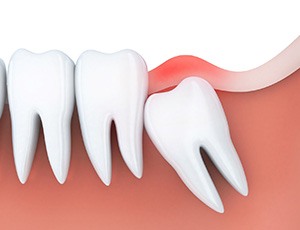
Every mouth and situation differs, so there's no flat fee to have a tooth removed. Many things can influence the cost. Your dentist will examine your mouth and create a personalized treatment plan. Although every case is unique, the amount of your estimate will be affected by:
- Type of Extraction: You will require either a simple or surgical extraction. A simple extraction can be performed when the tooth is fully visible above the gum surface. It is less complex than a surgical extraction, which is needed when a tooth is partially or fully impacted.
- Medications: Numbing medication will be used to keep you comfortable. Depending on the complexity of your tooth removal, you may require dental sedation.
- Complexity of Case: Not all tooth extractions are easy. If your treatment is complex, it may affect the cost.
Does Dental Insurance Cover Wisdom Tooth Extractions?

Dental insurance does not cover the entire cost of tooth extractions. However, your benefits may cover some of the expenses for certain steps, like your consultation, diagnostic services, or preparatory procedures. If sedation is medically necessary, your insurance may also pay some of the costs. You must meet your annual deductible for your benefits to be used. We will work on your behalf with your dental insurance to maximize your coverage to lower the amount you will pay out of pocket.
How to Make Wisdom Tooth Extractions Affordable
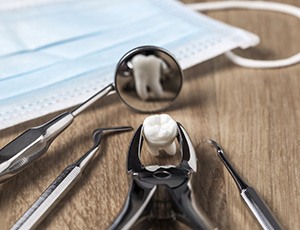
In addition to dental insurance, we offer other options to keep tooth extractions affordable. A member of our team will review your estimate and explain the fees. They will also discuss your payment options, which include:
- Traditional Payments: Our office accepts cash, personal checks, and most credit cards.
- Financing: Based on your credit approval, you may be a candidate for third-party financing. You can pay monthly installments with little or no interest in financing.
- Specials: Our office offers regular promotions for select services, like free second opinions. We will discuss any ongoing specials during your consultation.
Wisdom Tooth Extractions FAQs
Is Wisdom Tooth Removal Painful?
You may feel some discomfort after your wisdom teeth are removed, but the procedure itself should not be painful. Our team uses local anesthesia to numb the area, blocking pain signals from your brain during the extraction.
After the procedure, it’s normal to experience some swelling and soreness, which can be managed with prescribed pain medications, ice packs, and rest. Most patients find that discomfort mostly disappears within a few days, with full recovery taking about a week. If you feel extreme pain or continue to experience discomfort longer than that, don’t hesitate to reach out to us for a follow-up appointment.
What’s the Best Age to Get Wisdom Teeth Removed?
While there’s no “best” age to have your wisdom teeth removed, the sooner you have the procedure done, the better. Removing them early is much easier than performing the procedure years after the fact when the roots have become more secure. In addition, younger patients tend to heal faster and experience fewer post-operative issues.
That said, while it’s great to remove wisdom teeth before they cause problems like impaction or crowding, the procedure can still be performed successfully later in life. However, older patients may face a more challenging recovery process and an increased risk of complications.
How Should I Prepare for My Wisdom Tooth Extraction?
There are several small ways you can prepare for your procedure beforehand. Here are some of the most common that have helped our patients find success in the past:
- If at all possible, ask a friend or family member to drive you home afterward. You may still feel the effects of anesthesia, which can make driving a chore.
- Stock up on soft foods like yogurt, soups, and smoothies, which will be easier to eat while you recover.
- Make sure you have your prescribed medications like antibiotics and a stock of pain relievers on hand. This will help you manage discomfort and prevent infection.
- Avoid smoking or vaping at least 12 hours before your appointment as the chemicals can prohibit healing and create a risk of complications.
How Do You Avoid Dry Socket After Wisdom Teeth Removal?
Dry socket occurs when the blood clot protecting an extraction site is dislodged, exposing the bone and nerves. To prevent this, follow these general guidelines:
- Continue your oral hygiene routine, but brush and floss gently around the extraction area. Then, swish any mouthwash carefully and let it fall from your mouth instead of spitting.
- Avoid drinking through straws, smoking, or vaping for at least a week after surgery. Any kind of suction in your mouth can disturb blood clots that are still healing.
- Stick to soft, bland, and room-temperature foods and avoid chewing near the extraction site. This will keep your gums from being irritated or uncomfortable while they heal.
